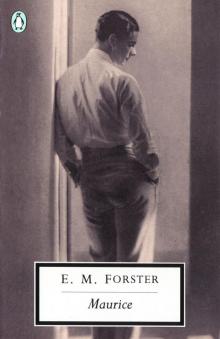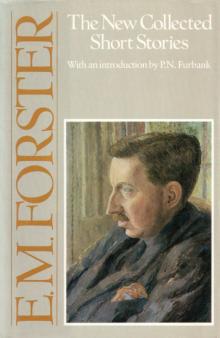- Home
- E. M. Forster
Works of E M Forster Page 4
Works of E M Forster Read online
Page 4
“Poor Lilia,” said he, genuinely moved. “I know it may be painful. But I have come to rescue you, and, book-worm though I may be, I am not frightened to stand up to a bully. He’s merely an insolent boy. He thinks he can keep you to your word by threats. He will be different when he sees he has a man to deal with.”
What follows should be prefaced with some simile — the simile of a powder-mine, a thunderbolt, an earthquake — for it blew Philip up in the air and flattened him on the ground and swallowed him up in the depths. Lilia turned on her gallant defender and said —
“For once in my life I’ll thank you to leave me alone. I’ll thank your mother too. For twelve years you’ve trained me and tortured me, and I’ll stand it no more. Do you think I’m a fool? Do you think I never felt? Ah! when I came to your house a poor young bride, how you all looked me over — never a kind word — and discussed me, and thought I might just do; and your mother corrected me, and your sister snubbed me, and you said funny things about me to show how clever you were! And when Charles died I was still to run in strings for the honour of your beastly family, and I was to be cooped up at Sawston and learn to keep house, and all my chances spoilt of marrying again. No, thank you! No, thank you! ‘Bully?’ ‘Insolent boy?’ Who’s that, pray, but you? But, thank goodness, I can stand up against the world now, for I’ve found Gino, and this time I marry for love!”
The coarseness and truth of her attack alike overwhelmed him. But her supreme insolence found him words, and he too burst forth.
“Yes! and I forbid you to do it! You despise me, perhaps, and think I’m feeble. But you’re mistaken. You are ungrateful and impertinent and contemptible, but I will save you in order to save Irma and our name. There is going to be such a row in this town that you and he’ll be sorry you came to it. I shall shrink from nothing, for my blood is up. It is unwise of you to laugh. I forbid you to marry Carella, and I shall tell him so now.”
“Do,” she cried. “Tell him so now. Have it out with him. Gino! Gino! Come in! Avanti! Fra Filippo forbids the banns!”
Gino appeared so quickly that he must have been listening outside the door.
“Fra Filippo’s blood’s up. He shrinks from nothing. Oh, take care he doesn’t hurt you!” She swayed about in vulgar imitation of Philip’s walk, and then, with a proud glance at the square shoulders of her betrothed, flounced out of the room.
Did she intend them to fight? Philip had no intention of doing so; and no more, it seemed, had Gino, who stood nervously in the middle of the room with twitching lips and eyes.
“Please sit down, Signor Carella,” said Philip in Italian. “Mrs. Herriton is rather agitated, but there is no reason we should not be calm. Might I offer you a cigarette? Please sit down.”
He refused the cigarette and the chair, and remained standing in the full glare of the lamp. Philip, not averse to such assistance, got his own face into shadow.
For a long time he was silent. It might impress Gino, and it also gave him time to collect himself. He would not this time fall into the error of blustering, which he had caught so unaccountably from Lilia. He would make his power felt by restraint.
Why, when he looked up to begin, was Gino convulsed with silent laughter? It vanished immediately; but he became nervous, and was even more pompous than he intended.
“Signor Carella, I will be frank with you. I have come to prevent you marrying Mrs. Herriton, because I see you will both be unhappy together. She is English, you are Italian; she is accustomed to one thing, you to another. And — pardon me if I say it — she is rich and you are poor.”
“I am not marrying her because she is rich,” was the sulky reply.
“I never suggested that for a moment,” said Philip courteously. “You are honourable, I am sure; but are you wise? And let me remind you that we want her with us at home. Her little daughter will be motherless, our home will be broken up. If you grant my request you will earn our thanks — and you will not be without a reward for your disappointment.”
“Reward — what reward?” He bent over the back of a chair and looked earnestly at Philip. They were coming to terms pretty quickly. Poor Lilia!
Philip said slowly, “What about a thousand lire?”
His soul went forth into one exclamation, and then he was silent, with gaping lips. Philip would have given double: he had expected a bargain.
“You can have them tonight.”
He found words, and said, “It is too late.”
“But why?”
“Because— “ His voice broke. Philip watched his face, — a face without refinement perhaps, but not without expression, — watched it quiver and re-form and dissolve from emotion into emotion. There was avarice at one moment, and insolence, and politeness, and stupidity, and cunning — and let us hope that sometimes there was love. But gradually one emotion dominated, the most unexpected of all; for his chest began to heave and his eyes to wink and his mouth to twitch, and suddenly he stood erect and roared forth his whole being in one tremendous laugh.
Philip sprang up, and Gino, who had flung wide his arms to let the glorious creature go, took him by the shoulders and shook him, and said, “Because we are married — married — married as soon as I knew you were, coming. There was no time to tell you. Oh. oh! You have come all the way for nothing. Oh! And oh, your generosity!” Suddenly he became grave, and said, “Please pardon me; I am rude. I am no better than a peasant, and I— “ Here he saw Philip’s face, and it was too much for him. He gasped and exploded and crammed his hands into his mouth and spat them out in another explosion, and gave Philip an aimless push, which toppled him on to the bed. He uttered a horrified Oh! and then gave up, and bolted away down the passage, shrieking like a child, to tell the joke to his wife.
For a time Philip lay on the bed, pretending to himself that he was hurt grievously. He could scarcely see for temper, and in the passage he ran against Miss Abbott, who promptly burst into tears.
“I sleep at the Globo,” he told her, “and start for Sawston tomorrow morning early. He has assaulted me. I could prosecute him. But shall not.”
“I can’t stop here,” she sobbed. “I daren’t stop here. You will have to take me with you!”
Chapter 3
Opposite the Volterra gate of Monteriano, outside the city, is a very respectable white-washed mud wall, with a coping of red crinkled tiles to keep it from dissolution. It would suggest a gentleman’s garden if there was not in its middle a large hole, which grows larger with every rain-storm. Through the hole is visible, firstly, the iron gate that is intended to close it; secondly, a square piece of ground which, though not quite, mud, is at the same time not exactly grass; and finally, another wall, stone this time, which has a wooden door in the middle and two wooden-shuttered windows each side, and apparently forms the facade of a one-storey house.
This house is bigger than it looks, for it slides for two storeys down the hill behind, and the wooden door, which is always locked, really leads into the attic. The knowing person prefers to follow the precipitous mule-track round the turn of the mud wall till he can take the edifice in the rear. Then — being now on a level with the cellars — he lifts up his head and shouts. If his voice sounds like something light — a letter, for example, or some vegetables, or a bunch of flowers — a basket is let out of the first-floor windows by a string, into which he puts his burdens and departs. But if he sounds like something heavy, such as a log of wood, or a piece of meat, or a visitor, he is interrogated, and then bidden or forbidden to ascend. The ground floor and the upper floor of that battered house are alike deserted, and the inmates keep the central portion, just as in a dying body all life retires to the heart. There is a door at the top of the first flight of stairs, and if the visitor is admitted he will find a welcome which is not necessarily cold. There are several rooms, some dark and mostly stuffy — a reception-room adorned with horsehair chairs, wool-work stools, and a stove that is never lit — German bad taste without German domesticity br
oods over that room; also a living-room, which insensibly glides into a bedroom when the refining influence of hospitality is absent, and real bedrooms; and last, but not least, the loggia, where you can live day and night if you feel inclined, drinking vermouth and smoking cigarettes, with leagues of olive-trees and vineyards and blue-green hills to watch you.
It was in this house that the brief and inevitable tragedy of Lilia’s married life took place. She made Gino buy it for her, because it was there she had first seen him sitting on the mud wall that faced the Volterra gate. She remembered how the evening sun had struck his hair, and how he had smiled down at her, and being both sentimental and unrefined, was determined to have the man and the place together. Things in Italy are cheap for an Italian, and, though he would have preferred a house in the piazza, or better still a house at Siena, or, bliss above bliss, a house at Leghorn, he did as she asked, thinking that perhaps she showed her good taste in preferring so retired an abode.
The house was far too big for them, and there was a general concourse of his relatives to fill it up. His father wished to make it a patriarchal concern, where all the family should have their rooms and meet together for meals, and was perfectly willing to give up the new practice at Poggibonsi and preside. Gino was quite willing too, for he was an affectionate youth who liked a large home-circle, and he told it as a pleasant bit of news to Lilia, who did not attempt to conceal her horror.
At once he was horrified too; saw that the idea was monstrous; abused himself to her for having suggested it; rushed off to tell his father that it was impossible. His father complained that prosperity was already corrupting him and making him unsympathetic and hard; his mother cried; his sisters accused him of blocking their social advance. He was apologetic, and even cringing, until they turned on Lilia. Then he turned on them, saying that they could not understand, much less associate with, the English lady who was his wife; that there should be one master in that house — himself.
Lilia praised and petted him on his return, calling him brave and a hero and other endearing epithets. But he was rather blue when his clan left Monteriano in much dignity — a dignity which was not at all impaired by the acceptance of a cheque. They took the cheque not to Poggibonsi, after all, but to Empoli — a lively, dusty town some twenty miles off. There they settled down in comfort, and the sisters said they had been driven to it by Gino.
The cheque was, of course, Lilia’s, who was extremely generous, and was quite willing to know anybody so long as she had not to live with them, relations-in-law being on her nerves. She liked nothing better than finding out some obscure and distant connection — there were several of them — and acting the lady bountiful, leaving behind her bewilderment, and too often discontent. Gino wondered how it was that all his people, who had formerly seemed so pleasant, had suddenly become plaintive and disagreeable. He put it down to his lady wife’s magnificence, in comparison with which all seemed common. Her money flew apace, in spite of the cheap living. She was even richer than he expected; and he remembered with shame how he had once regretted his inability to accept the thousand lire that Philip Herriton offered him in exchange for her. It would have been a shortsighted bargain.
Lilia enjoyed settling into the house, with nothing to do except give orders to smiling workpeople, and a devoted husband as interpreter. She wrote a jaunty account of her happiness to Mrs. Herriton, and Harriet answered the letter, saying (1) that all future communications should be addressed to the solicitors; (2) would Lilia return an inlaid box which Harriet had lent her — but not given — to keep handkerchiefs and collars in?
“Look what I am giving up to live with you!” she said to Gino, never omitting to lay stress on her condescension. He took her to mean the inlaid box, and said that she need not give it up at all.
“Silly fellow, no! I mean the life. Those Herritons are very well connected. They lead Sawston society. But what do I care, so long as I have my silly fellow!” She always treated him as a boy, which he was, and as a fool, which he was not, thinking herself so immeasurably superior to him that she neglected opportunity after opportunity of establishing her rule. He was good-looking and indolent; therefore he must be stupid. He was poor; therefore he would never dare to criticize his benefactress. He was passionately in love with her; therefore she could do exactly as she liked.
“It mayn’t be heaven below,” she thought, “but it’s better than Charles.”
And all the time the boy was watching her, and growing up.
She was reminded of Charles by a disagreeable letter from the solicitors, bidding her disgorge a large sum of money for Irma, in accordance with her late husband’s will. It was just like Charles’s suspicious nature to have provided against a second marriage. Gino was equally indignant, and between them they composed a stinging reply, which had no effect. He then said that Irma had better come out and live with them. “The air is good, so is the food; she will be happy here, and we shall not have to part with the money.” But Lilia had not the courage even to suggest this to the Herritons, and an unexpected terror seized her at the thought of Irma or any English child being educated at Monteriano.
Gino became terribly depressed over the solicitors’ letter, more depressed than she thought necessary. There was no more to do in the house, and he spent whole days in the loggia leaning over the parapet or sitting astride it disconsolately.
“Oh, you idle boy!” she cried, pinching his muscles. “Go and play pallone.”
“I am a married man,” he answered, without raising his head. “I do not play games any more.”
“Go and see your friends then.”
“I have no friends now.”
“Silly, silly, silly! You can’t stop indoors all day!”
“I want to see no one but you.” He spat on to an olive-tree.
“Now, Gino, don’t be silly. Go and see your friends, and bring them to see me. We both of us like society.”
He looked puzzled, but allowed himself to be persuaded, went out, found that he was not as friendless as he supposed, and returned after several hours in altered spirits. Lilia congratulated herself on her good management.
“I’m ready, too, for people now,” she said. “I mean to wake you all up, just as I woke up Sawston. Let’s have plenty of men — and make them bring their womenkind. I mean to have real English tea-parties.”
“There is my aunt and her husband; but I thought you did not want to receive my relatives.”
“I never said such a— “
“But you would be right,” he said earnestly. “They are not for you. Many of them are in trade, and even we are little more; you should have gentlefolk and nobility for your friends.”
“Poor fellow,” thought Lilia. “It is sad for him to discover that his people are vulgar.” She began to tell him that she loved him just for his silly self, and he flushed and began tugging at his moustache.
“But besides your relatives I must have other people here. Your friends have wives and sisters, haven’t they?”
“Oh, yes; but of course I scarcely know them.”
“Not know your friends’ people?”
“Why, no. If they are poor and have to work for their living I may see them — but not otherwise. Except— “ He stopped. The chief exception was a young lady, to whom he had once been introduced for matrimonial purposes. But the dowry had proved inadequate, and the acquaintance terminated.
“How funny! But I mean to change all that. Bring your friends to see me, and I will make them bring their people.”
He looked at her rather hopelessly.
“Well, who are the principal people here? Who leads society?”
The governor of the prison, he supposed, and the officers who assisted him.
“Well, are they married?”
“Yes.”
“There we are. Do you know them?”
“Yes — in a way.”
“I see,” she exclaimed angrily. “They look down on you, do they, poor boy? Wait!�
�� He assented. “Wait! I’ll soon stop that. Now, who else is there?”
“The marchese, sometimes, and the canons of the Collegiate Church.”
“Married?”
“The canons— “ he began with twinkling eyes.
“Oh, I forgot your horrid celibacy. In England they would be the centre of everything. But why shouldn’t I know them? Would it make it easier if I called all round? Isn’t that your foreign way?”
He did not think it would make it easier.
“But I must know some one! Who were the men you were talking to this afternoon?”
Low-class men. He could scarcely recollect their names.
“But, Gino dear, if they’re low class, why did you talk to them? Don’t you care about your position?”
All Gino cared about at present was idleness and pocket-money, and his way of expressing it was to exclaim, “Ouf-pouf! How hot it is in here. No air; I sweat all over. I expire. I must cool myself, or I shall never get to sleep.” In his funny abrupt way he ran out on to the loggia, where he lay full length on the parapet, and began to smoke and spit under the silence of the stars.
Lilia gathered somehow from this conversation that Continental society was not the go-as-you-please thing she had expected. Indeed she could not see where Continental society was. Italy is such a delightful place to live in if you happen to be a man. There one may enjoy that exquisite luxury of Socialism — that true Socialism which is based not on equality of income or character, but on the equality of manners. In the democracy of the caffe or the street the great question of our life has been solved, and the brotherhood of man is a reality. But is accomplished at the expense of the sisterhood of women. Why should you not make friends with your neighbour at the theatre or in the train, when you know and he knows that feminine criticism and feminine insight and feminine prejudice will never come between you? Though you become as David and Jonathan, you need never enter his home, nor he yours. All your lives you will meet under the open air, the only roof-tree of the South, under which he will spit and swear, and you will drop your h’s, and nobody will think the worse of either.

 The Celestial Omnibus and Other Stories
The Celestial Omnibus and Other Stories Maurice
Maurice The Longest Journey
The Longest Journey Howards End
Howards End A Room with a View
A Room with a View The New Collected Short Stories
The New Collected Short Stories A Passage to India
A Passage to India Where Angels Fear to Tread
Where Angels Fear to Tread Works of E M Forster
Works of E M Forster Selected Stories
Selected Stories The Machine Stops
The Machine Stops Aspects of the Novel
Aspects of the Novel